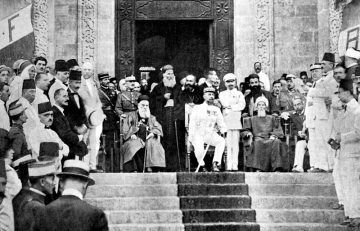Ussama Makdisi in aeon:
 Throughout modern history, the weight of Western colonialism in the name of freedom and religious liberty has distorted the nature of the Middle East. It has transformed the political geography of the region by creating a series of small and dependent Middle Eastern states and emirates where once stood a large interconnected Ottoman sultanate. It introduced a new – and still unresolved – conflict between ‘Arab’ and ‘Jew’ in Palestine just when a new Arab identity that included Muslim, Christian and Jewish Arabs appeared most promising. This late – last – Western colonialism has obscured the fact that the shift from Ottoman imperial rule to post-Ottoman Arab national rule was neither natural nor inevitable. European colonialism abruptly interrupted and reshaped a vital anti-sectarian Arab cultural and political path that had begun to take shape during the last century of Ottoman rule. Despite European colonialism, the ecumenical ideal, and the dream of creating sovereign societies greater than the sum of their communal or sectarian parts, survived well into the 20th-century Arab world.
Throughout modern history, the weight of Western colonialism in the name of freedom and religious liberty has distorted the nature of the Middle East. It has transformed the political geography of the region by creating a series of small and dependent Middle Eastern states and emirates where once stood a large interconnected Ottoman sultanate. It introduced a new – and still unresolved – conflict between ‘Arab’ and ‘Jew’ in Palestine just when a new Arab identity that included Muslim, Christian and Jewish Arabs appeared most promising. This late – last – Western colonialism has obscured the fact that the shift from Ottoman imperial rule to post-Ottoman Arab national rule was neither natural nor inevitable. European colonialism abruptly interrupted and reshaped a vital anti-sectarian Arab cultural and political path that had begun to take shape during the last century of Ottoman rule. Despite European colonialism, the ecumenical ideal, and the dream of creating sovereign societies greater than the sum of their communal or sectarian parts, survived well into the 20th-century Arab world.
The ‘sick man of Europe’ – the condescending European sobriquet for the sultanate – was not, in fact, in terminal decline at all in the early 20th century. Contrary to hoary stories of Turkish rapacity and decline, or romanticised glorifications of Ottoman rule, the truth is that the final Ottoman century saw a new age of coexistence at the same time as it also ushered in competing ethnoreligious nationalisms, war and oppression in the shadow of Western domination. The violent part of the story is well-known; the far richer ecumenical one, barely at all.
More here.
